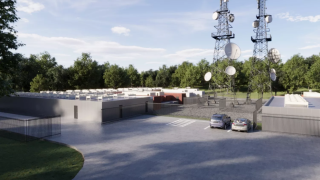The pandemic, new projects and even new players have all redefined wholesale connectivity in the three years since GlobalConnect became an opco of MTN.
Spurred on by a raft of new subsea projects around Africa, the global rise of the enterprise and the needs for telcos to become tech-cos, today MTN GlobalConnect (MTN GC) is on a mission to densify and extend its terrestrial fibre network across Africa.
“The volume of data traffic is booming,” says CEO Frédéric Schepens. “This means we will require a more dense and robust terrestrial fibre network. We are looking at in-country fibre networks, cross-border fibre links, and forming regional rings, and east coast to west coast fibre routes,” he says.
The last time Schepens spoke to Capacity he shared details of the half a billion dollars in capex that would support MTN GC’s fibre build-out plans. At present the ambition is to reach a footprint of 135,000km by 2025 – of which MTN GC contributed about 4,400km last year, along with 15 new cross-border links, to take the total to 100,000km.
The first step is the structural separation of the firm’s assets and this element is due to complete in 2023, with separations currently under way in markets such as South Africa, Nigeria, Ghana, Côte d’Ivoire, and Uganda.
In parallel, the fibre continues to roll out and has seen fibrecos established in Zambia and Kenya – “key markets to set up our fibre companies”, Schepens says.
“Our choices are strategic and have an impact on the social and economic benefits of host countries as well,” he adds. Kenya stands as a strong example of this. It’s a hub for the 2Africa cable and borders five other nations.
Earlier this year MTN GC acquired MTN Business Kenya, allowing it to expand its digital wholesale and infrastructure services across the domestic market.
“Our infrastructure build includes investments in subsea and terrestrial expansion, with each year capitalising on the previous one. We continue to strengthen our position as the leading pan-African fibreco,” says Schepens.
Along with South Africa and Nigeria, Kenya is one of three major hubs Schepens identifies across the continent where demand for fibre connectivity is growing. It’s part of why MTN GC invested more than US$9 million in the country last year and increased headcount there by 35%.
“These three strategic hubs attract a lot of activity. We will continue to inject incremental foreign and direct investments across Africa to build the much-needed terrestrial backbone with an extensive fibre-optic network that will expand broadband connectivity and further integrate the continent,” Schepens says.
“MTN GlobalConnect is committed to extending and accelerating fast and affordable broadband access from the East to the West of Africa. This investment will interconnect countries by building digital hubs and connecting landlocked countries to subsea cables. Integration is where we are headed,” he adds.
Universal access
A pre-pandemic report from the World Bank called for investments of $100 billion across Africa to achieve universal access to broadband connectivity by 2030. It also stated how little progress has been made since the year 2000, when the whole of Africa had less international internet bandwidth than Luxembourg. It called for 250,000 new 4G base stations and at least 250,000km of fibre.
“We must partner and support one another. This is a large continent we are connecting,” says Schepens of the work at hand.
For its part, in 2021 MTN GC signed fixed external infrastructure deals worth $38.4 million in total contract value terms – and Schepens says the customer base “keeps growing when it comes to global players”.
He concludes: “MTN GlobalConnect is building, using, and sharing. We will support this evolution by operating our pan-African proprietary fibre network in an open access model. This is the most effective way to provide access to carriers, OTTs, and service providers. Our wholesale mobility services capitalise on the infrastructure and the magnitude of the MTN customer base, which is currently more than 272 million subscribers.
“We can offer an array of digital connectivity services through our signalling, voice, messaging, and roaming communication platforms. We are fortunate to have access to such a large customer base and to be able to design solutions for our partners to reach this substantial population.”





